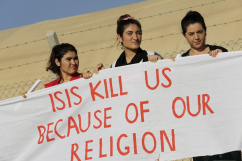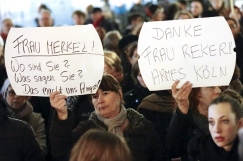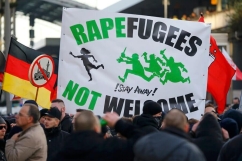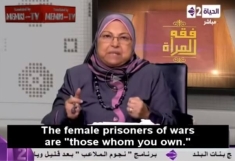Some of the thousands of Yazidi women captured and enslaved by Islamic State (ISIS) militants in Sinjar, northern Iraq have managed to escape to describe the horrific abuse, rape, slavery and brutal torture they suffered in the hands of their barbaric captors, the Daily Mail reported.
The ISIS militants even forced the women, some just teenagers, to watch the murder of their families before they were sold into sexual slavery, the news outlet said.
Some of the women who found a way to escape and return home reportedly carried the unborn children of their captors.
Seivan Salim, an Iraqi female photographer, tracked down some of the escaped women now living in refugee camps and photographed them wearing the traditional white Yazidi wedding dress—a symbol for purity.
Salim also asked the women to share their sad stories to the world. Some obliged, and here are their recollections:
Perla, 21, from Kojo, Sinjar, said she was captured on Aug. 15, 2014, and held by her ISIS captors for 10 months.
She said when the ISIS fighters came everyone fled to the mountain, but the militants captured them on the way and told them to stay in the village where they would be safe. "They said that we would be freed. They lied. They took us to Syria by bus. I was with around 400 other girls," Perla said.
She said the man who took her as a sex slave was "very angry," often beating her and even threatening to shoot her. He later sold her to another man, who brought her to Raqqa.
The man took her to an underground prison where she stayed with other girls for 12 days. He later got fed up with her and sold her again in the slave market.
She said she was bought by a Frenchman who quickly resold her to an old Saudi who was living with a Jordanian woman.
There were five men one of whom was French. He asked me if I knew how to cook and if I spoke Arabic. I told him I didn't. "They brought me a black abaya and some food. They left me in a room on the ground floor without locking it. I put on the abaya and ran away," she said.
For her part, Rooba, 28, from Kojo, Sinjar, said she was also captured on Aug. 15, 2014, and held for 10 months.
"We were in Tal Afar for two months, then they brought us to Raqqa in Syria. There were about 300 of us girls there, in a big hall. All the women had babies who cried because they were so hungry. The children were only given one egg a day," Rooba said.
She said right on the first night nine girls tried to flee. They tied their clothes together to make a rope and lowered themselves out of the window, but the ISIS fighters found them and brought them back. "They hit all of us because we didn't tell them about their escape," Rooba said.
Later she was sold to a 40-year-old man from Saudi Arabia. "He asked me to marry him, and when I refused he pointed to three objects sitting on his table; a knife, a gun, and rope. He said he'd use all three if I didn't say yes. I refused over and over again, so he beat me. He also beat my niece, who is only 3 years old," Rooba said.
Delvin, 27, also from Kojo, Sinjar, was likewise captured on Aug. 15, 2014 by ISIS militants and held for four months
"I was pregnant and I had other children with me. They were very cruel to us. Even though I was pregnant they would beat me and try to have sex with me. If I didn't accept to have sex with the men of the family, they would force me anyway," she said.
Delvin said the ISIS men raped her over and over again. "I was sold again, this time to a family from Saudi Arabia... I moved again to another city where my baby was born. I was raped there too, despite the fact that I just had given birth," she said.
Amal, 18, from Talqasab, Sinjar, said she was captured by ISIS on Aug. 3, 2014 and held for 11 months.
"They separated the women from the men and brought me with 17 other girls back to Tal Afar. They kept moving us around: first Zommar for a month, then Kasrolmehrab where we stayed for three months and lastly Hayolkhazra," she said.
She said the worst thing she saw was the killings in Sinjar. "I saw so many corpses on the road; it was terrible. The saddest thing I remember, during those terrible months, was this little girl, 12 years old. They raped her without mercy," she recalled.



















